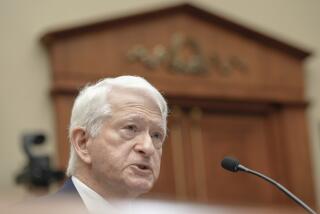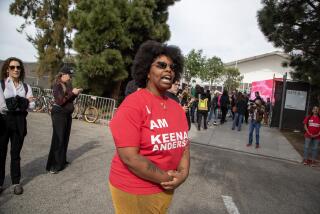Forum Explores Police Abuses
- Share via
The eight members of Congress who came to Inglewood High School on Monday hailed from five states, each bringing their constituents’ horror stories of police misconduct.
They told of brutal beatings and shootings and of confessions coerced from innocent men after hours of interrogation in Illinois, Michigan, Virginia, Alabama and California.
They had a receptive audience: an auditorium half-filled with people who had seen the July 6 videotaped beating of Donovan Jackson.
Jackson sat with his family in the second row, listening as lawyers, politicians and law enforcement experts talked about how to prevent and combat police misconduct, which Rep. Earl Hilliard (D-Ala.) called “a national problem.”
The forum offered no new insights into the lawsuits that resulted from Jackson’s beating, and Jackson did not speak. But the forum, which attracted about 300 people, gave experts a chance to discuss police brutality.
The crowd favorite wasn’t Los Angeles County Sheriff Lee Baca or state Atty. Gen. Bill Lockyer--who detailed how their departments handle abuse claims--but Preston Gilstrap, the chairman of the National Black Police Assn.
Gilstrap said the solution to police brutality is simple: “When you start sending police officers to jail, excessive force will stop,” he said.
“We must stop putting lipstick on this gorilla,” Gilstrap repeated often, to howls and applause from audience members.
The eight members of Congress are all members of the Congressional Black Caucus, and the forum was organized by Rep. Maxine Waters (D-Los Angeles).
The forum also sought to garner support for House Bill 3981, the Law Enforcement Trust and Integrity Act. If passed, the bill would commission several studies on police brutality, increase spending to prosecute cases, train officers and collect data on racial profiling.
Several people said they were glad the forum examined police misconduct issues. Some, including an Inglewood resident, Byron Scott, lamented that it focused on experts and didn’t offer more time for public comment.
Scott said he wished the caucus members could have heard more “of what the brothers are really feeling.”
More to Read
Get the L.A. Times Politics newsletter
Deeply reported insights into legislation, politics and policy from Sacramento, Washington and beyond. In your inbox twice per week.
You may occasionally receive promotional content from the Los Angeles Times.










